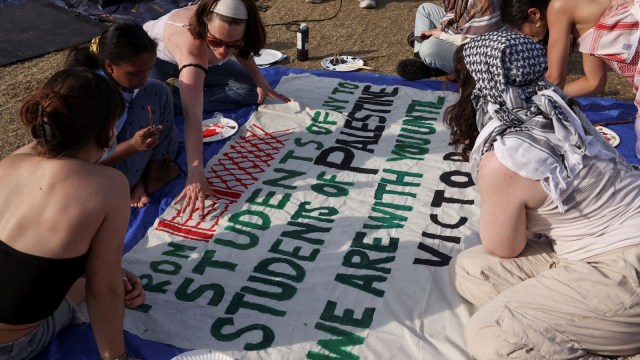
As a teacher, I have always felt that there is something more in education than the acquisition of a set of academic/cognitive/technical skills; it is essentially about a deep sensitivity to culture, politics and social justice; in fact, it is a quest for freedom from war, militarism, hyper-nationalism and authoritarianism. Hence, as I see young university students in the US — from Columbia to New York University (NYU), from the University of Texas to the University of South California — protesting and raising their voices against the ongoing war in Gaza in which some 34,000 people have already died, it arouses my hope. I see great merit in their demand for US educational bodies to disentangle from companies profiting from Israel’s war on Gaza. Yes, these students are alive — intellectually, politically and ethically. Think of the intensity of the slogan the students of New York University chanted: “Israel bombs, NYU pays, how many kids have you killed today?”
Likewise, the students of Columbia University are demanding the resignation of University President Minouche Shafik because she called the police on the campus. And yes, this protest has indeed unsettled the Establishment. While New York police department’s specialist counter-terrorism division arrested more than 120 NYU students and faculty members, Columbia University officials had warned student members of the Gaza Solidarity Encampment. New York’s mayor Eric Adams blamed the NYU protestors as “professional agitators”; President Joe Biden didn’t hesitate to castigate the protests as “antisemitic”. The University of South California cancelled the formal graduation ceremony function, and prevented Muslim student Asna Tabassum from making her valedictory speech over her public support for Palestine. This ongoing protest, as The New York Times columnist Charles M Blow has suggested, “could summon the ghosts of 1968 when college protests against the Vietnam war spilled into the national political domain”.
As I try to make sense of this protest — or, the creative agency of young students, I feel a similar trend in our own country. We have not yet forgotten how the ruling Establishment castigated the students of Jawaharlal Nehru University — those who raised their voices against exclusionary religious nationalism, and the neoliberal assault on education— as part of the tukde tukde gang. We know the way the politically appointed vice chancellors of some of our leading public universities sought to repress and punish young students who were protesting against the proposed Citizen (Amendment) Act, 2019. The cops entering the university library, the goons attacking the students and the faculty members inside the university campus, or in recent times, the extraordinary enthusiasm on the part of a bunch of politically conformist, morally weak and docile academic bureaucrats to prevent students from screening the much talked about BBC documentary on the 2002 Gujarat riots: These techniques of “discipline” and surveillance indicate that the system is always afraid of young minds who have not yet lost their moral and intellectual power, and dream of a just society.
We are living in a world characterised by heightened economic inequality, rising authoritarianism and physical/cultural/symbolic violence. In a world of this kind, education is often seen as mere training — an act of transforming young students into useful resources for the techno-corporate empire, or the docile employees of the corporate billionaires; or, a mode of cultural/psychic brainwashing that transforms them into loyal “nationalists”: A non-thinking/non-reflexive crowd always ready to castigate the constructed “enemies” of the nation.
Likewise, the culture industry tends to seduce young minds through the gospel of hedonistic consumption — the irresistible greed for “new” products, brands and symbols. No wonder, in these toxic times, the spirit of critical pedagogy is in danger. The ruling establishment loathes the kind of education that inspires one to ask critical questions, interrogate the dominant common sense of the age, debunk the politics of war, militarism and hyper-nationalism, and strive for a humane/democratic/egalitarian/peaceful world. But then, as our students from the US to India — yes, the students filled with conscience and creative life-energy — are standing up, raising their voice, and protesting against war, genocide, racism and communalism, a ray of hope begins to illumine us.
Is it the time for us to wake up, and sing once again the songs of John Lennon, Bob Dylan and Salil Chowdhury, and walk with the students trying to activate our lost conscience with their intellectual clarity and political sensitivity?
Pathak writes on culture and education
© The Indian Express Pvt Ltd
First uploaded on: 29-04-2024 at 18:16 IST


